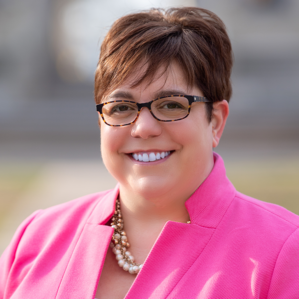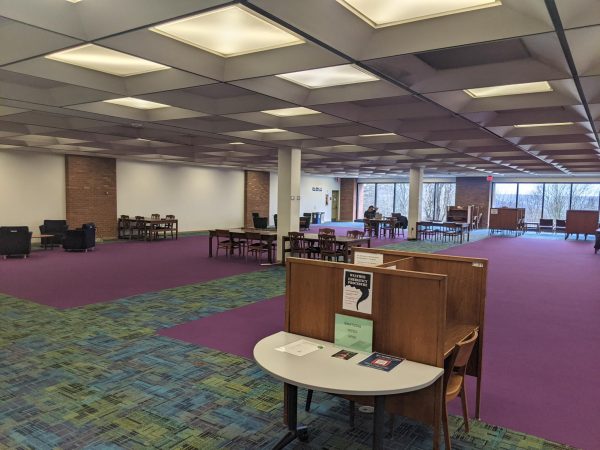Title IX Coordinator addresses student government
Allegheny College’s Title IX Coordinator Gilly Ford addressed Allegheny Student Government on Tuesday, Feb. 14. Ford presented the general assembly with a broad overview of policies and procedures surrounding Title IX.
Ford said Title IX, which forbids discrimination on the basis of gender in higher education, is often misunderstood.
“A lot of the time people think that Title IX only applies to women, which is simply not true,” Ford said.
The number of reported cases of sexual assault at Allegheny has been increasing slightly in the last few years, according to Ford. She said she attributes this trend to the increased visibility of the Title IX Office on campus. She did not clarify if this meant formal or informal reports.
“I feel like there is more reporting, which is good,” Ford said.
While she said she feels reporting has increased, Ford encouraged anyone who has been assaulted to come forward.
“We are asking you to report it so we can address it,” Ford said. “If some sort of hostile environment has been created in our college community, we want to take those reports seriously and respond as promptly as we can.”
Sen. Walter Stover, ’17, voiced his concerns about recent comments from newly-appointed Secretary of Education Betsy DeVos.
During her Senate confirmation hearing, DeVos refused to state whether she would support the U.S. Department of Education’s Office for Civil Rights’ 2011 “Dear Colleague” letter. The letter advised school officials that sexual assault should be considered a form of sexual harassment and prohibited under Title IX. The letter also told officials to use a standard of “preponderance of evidence” when investigating such cases.
Ford said even if such action was taken by DeVos to rescind the letter, she felt the college would continue to handle sexual assault in the same way.
“I think there is a lot left to be seen. However, I feel the college is committed to the safety of our community, so I really would have a hard time imagining there not continuing to be attention to these particular issues,” Ford said.
Director of Public Safety Ali Awadi agreed with Ford.
“They can’t just remove Title IX,” Awadi said. “I think what [DeVos] is talking about is the enforcement.”
Awadi said even if the enforcement of Title IX was limited by any action taken by the federal government, the college would continue to follow a policy of “strict enforcement.”
When an assault is reported, according to Ford, the college will reach out to the survivor and provide them with their options.
In terms of reporting the incident, Ford said a survivor has several options. They may report the incident to the police, who will investigate. If a student reports to the police, the district attorney will decide if there is enough evidence to prosecute the case. A survivor may also chose to report the incident to the college either as a formal or informal complaint.
Ford said that in an informal complaint, the goal is to reach a solution or understanding between both parties. She said mediation is sometimes used in other proceedings, but not in cases of sexual assault. The survivor may also choose to make a formal complaint, which triggers an investigation by the college and may lead to disciplinary sanctions if the student is found “responsible.”
Disciplinary sanctions can include expulsion, suspension or probation, according to Ford. The student may also be required to complete some sort of educational component such as an online learning module on sexual assault.
“All of our processes here on campus are educational ones. They are not criminal processes,” Ford said. “Our role is to ensure that there is a prompt, thorough and equitable process for all the parties involved.”
Ford said a large part of her office involves education. She said this has meant making Title IX and consent part of the freshman orientation and working with athletic teams on campus to ensure that sexual assault is understood.
“Believe it or not, sometimes when people come to campus, they are just not educated about what is acceptable and what is not acceptable,” Ford said.
Gretchen Beck, associate dean and director of student leadership and involvement and ASG’s faculty adviser, also delivered a report on a meeting she had with the Crawford Area Transit Authority regarding The Loop.
Beck said the meeting with CATA was prompted by concerns expressed by members of ASG at its meeting on Feb. 7. At the meeting, several senators brought up concerns that students were being stranded in Meadville after the final Loop run of the evening.
After meeting with CATA representatives, Beck said they have agreed to modify the schedule with a bus arriving every ten minutes between the hours of 11 p.m. and 2:30 a.m. This is an increase in frequency from one every 20 minutes. She said while CATA was happy to make changes to help students, there are some concerns that they also wanted to be addressed.
Beck said several drivers have reported inappropriate and sometimes dangerous behavior perpetrated by students. She said this includes students tearing up CATA maps and brochures and leaving them on the floors of the buses, and students trying to pry open closed doors.
Beck encouraged senators and cabinet members to pass these concerns along to their constituents wherever possible.
“We need to address [these concerns] with our peers,” Beck said.









Dana D'Amico • Feb 22, 2017 at 12:27 pm
Here I am left conflicted by Ford’s statement, which turned out to be the wrong one–that she “feels” that there has been more reporting. There is no feeling–there are data. What are the 2016 numbers? Because, as The Campus reported in its two-part piece, reports fell between 2014 and 2015. Has there been a response since this address to ASG?